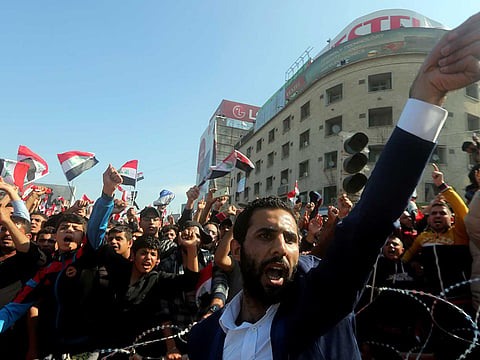New Baghdad wall may be pie-in-the-sky security
The wall is seen by the government and security authorities as the best way to ensure the security and safety of citizens

The wall that is being constructed by the Iraqi government around the city of Baghdad indicates a sorry state of affairs in response to the worsening situation in the country, which the Haider Al Abadi government is seeking to contain: the killings of innocent civilians. Although the government is projecting an ambivalent attitude towards the wall, which will be three metres high and skirt an area of nearly 300 kilometres, the aim is to end the violent killings and bombings that have marred the city since January and resulted in the death of 490 civilians and wounded 1,157, according to the UN.
The wall, a brainchild of the Iraqi Ministry of Interior, its army and subtly backed by the government, is being made because of what politicians argue to be the new onslaught on Baghdad by Daesh (the self-proclaimed Islamic State of Iraq and the Levant), which is still in control of the north and north-western territories of the country, despite the continuing coalition air strikes on its bases. Of the January figures, Baghdad was the worst hit with 299 civilians killed and 785 wounded through explosions and booby-trapped cars. The proponents of the wall believe the violence is coming from outside Baghdad, in Daesh-controlled regions and that the wall will protect the city’s citizens. It is supposed to make amends by encapsulating Baghdad with its diverse Sunni and Shiite divide, which have also been split by different walls and barricades along geographical areas and neigbourhoods. But will it make amends? Take the view of Sunni Iraqi Assembly MP Mohammad Al Karbouli, also on the parliamentary Security and Defence Committee. He says the wall — the first 100 kilometres of which are due to be completed in the next six months — is designed to isolate the mainly Sunni-dominated tribal areas outside the Iraqi capital. They fear, and quite rightly so, that the wall will divide and weaken them from the capital.
While it’s now fairly certain that Baghdad, 12 months down the road, is expected to have its own solid wall, the idea of stability and safety is still far from guaranteed because of the deteriorating security situation created during and after the US occupation to 2011 when the last of the American troops pulled out of the country.
Iraq under the American occupation and afterwards, became a sliced up city, cut up in a maze of interconnecting paths, detours and alleyways. The fortified “Green Zone” — where government offices, National Assembly and foreign embassies, including the American one, are located — is expected to stay as it is, under strict security. The checkpoints, barbed wire and concrete barriers built by the US army, euphemistically the “labyrinth of blast walls” to “insulate” banks, schools, government buildings, hospitals, supermarkets and university campuses and entire neighbourhoods and streets on Sunni-Shiite divides, are set to be thrown asunder once the giant wall is built.
Iraq’s top military brass say the wall will cut the number of checkpoints in the capital by 50 per cent, which, if true, would be of benefit to the people of the capital.
Will the current prime minister guarantee security? One thing is certain; the Iraqi authorities must hurry up with their wall experiment if they want to have a crack at stopping the violence. Only the other day two suicide bombers wrecked a Shiite mosque in Baghdad causing the death of at least 15 people and wounding scores more under the so-called ‘double-tap’ bombing.
Marwan Asmar is a commentator based in Amman. He is a journalist and has a PhD in political science from Leeds University in the UK.
Sign up for the Daily Briefing
Get the latest news and updates straight to your inbox


